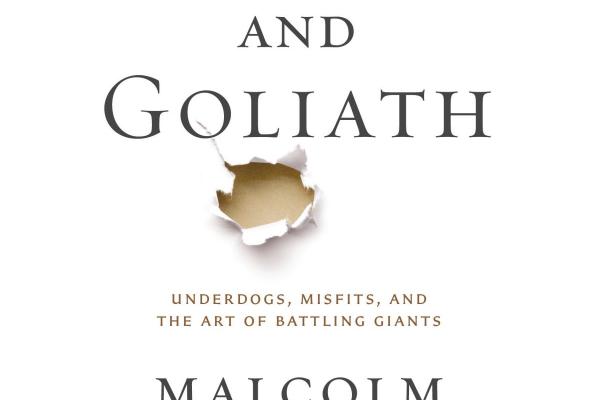What if what you thought were advantages were actually disadvantages? And what you thought were disadvantages ended up being what actually makes people successful?
So embarks best-selling author Malcolm Gladwell of Blink, The Tipping Point, Outliers, and What the Dog Saw in his new book: David and Goliath. In the same clear, concise style that made his other books so intriguing, Gladwell challenges yet another widespread assumption — that being the underdog tends to make one an underdog forever.
Instead he argues that being the underdog can give one the upper hand. In his signature approach, Gladwell supports his hypothesis with a series of narratives, from the classic case of David and Goliath to the forgiveness one Canadian Mennonite woman was able to work towards after her daughter was murdered. Like his previous books, David and Goliath is both entertaining and thought provoking and obliges readers reflect over their lives and reconsider personal “disadvantages” that actually required them to learn skills they otherwise might not have had.
Gladwell is not a social scientist. Although the examples of statistical evidence that he draws on to support his claims do not seem exhaustive and leave something to be desired, his nose for apparent patterns in the rise and fall of what makes success are fascinating. In David and Goliath, Gladwell uses what is known as an inverted-U curve to support his claims. The idea is that advantages are only advantages up until a certain point. After that, these so-called “advantages” begin to hinder one’s life. We all need enough to live and to provide for our basic needs. But once those needs are met, the leg-up comes from learning how to work, developing creativity, being resourceful, and struggling through challenges until we either learn how to plow through the challenges or discover a way to go around them.
In parts two and three of David and Goliath, titled “The Theory of Desirable Difficulty” and “The Limits of Power” respectively, Gladwell segues into two ideas: that difficulty can be a positive thing and that those in power are not nearly as strong as one might think they are.
In “The Theory of Desirable Difficulty,” Gladwell uses several examples of highly successful dyslexic individuals to argue that although dyslexia seems to be an incredible disadvantage in a world that relies so heavily on the ability to read well, in some measure, their disorder has helped them to succeed.
Perhaps, as Gladwell seems to think, what is important is not as much what we are given in life, but how we react to what is given to us. If, like David Boies, you are born with dyslexia and struggle with reading, then you work with what you can and you develop a way to compensate for your disability. As Gladwell asks, “would you wish dyslexia on your children?” Perhaps you would if it taught them how to do well despite adversity.
In the final section of the book, Gladwell uses a variety of different stories to illustrate his last point: that the powerful are often not nearly as strong as they seem, and that the weak are not nearly as helpless. In one of the best passages from the book he writes:
It was not the privileged and fortunate who took in the Jews in France. It was the marginal and the damaged, which should remind us that there are real limits to what evil and misfortune can accomplish. … One time in ten, out of that despair rises an indomitable force. You see the giant and the shepherd in the Valley of Elah and your eye is drawn to the man with the sword and the shield and the glittering armor. But so much of what is beautiful and valuable in the world comes from the shepherd, who has more strength and purpose than we ever imagine.
It’s easy to see why Gladwell’s books sell so well. He encourages his readers to see their lives and the society around them with fresh eyes. David and Goliath is not only a hopeful book — praising the power of ordinary people who appear to have no material advantage — it’s the one that most clearly reveals Gladwell’s ties to his Mennonite-Christian upbringing in southwestern Ontario and the one that influenced him to return to the faith that he had drifted away from as an adult.
Kara Lofton is the Online and Editorial Assistant at Sojourners.
Got something to say about what you're reading? We value your feedback!
